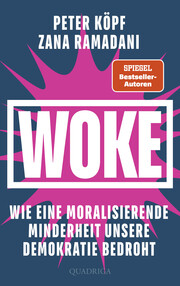Detailansicht
WOKE - Wie eine moralisierende Minderheit unsere Demokratie bedroht
eBook
ISBN/EAN: 9783751733090
Umbreit-Nr.: 860733
Sprache:
Deutsch
Umfang: 286 S., 1.04 MB
Format in cm:
Einband:
Keine Angabe
Erschienen am 29.09.2023
Auflage: 1/2023
E-Book
Format: EPUB
DRM: Nicht vorhanden
€ 19,99
(inklusive MwSt.)
Sofort Lieferbar
- Zusatztext
-
Sie halten sich für wissend und klüger als die Mehrheit: die »Aktivisten« der WOKENESS. Ihr Marsch durch die Institutionen verändert die Regeln in Hochschulen, Verwaltung, Medien und Parteien. Im Kampf für immer mehr angebliche Opfergruppen nötigen sie der Mehrheit neue Regeln auf - ohne demokratische Legitimation. Was die WOKEN für eine egalitäre Politik halten, ist eine elitäre. Wer sich wehrt, wird ausgegrenzt und diffamiert. Wohin aber gehen Menschen, wenn sie sich von den Säulen des Staats bevormundet sehen?WOKENESS ist toxisch für die Demokratie, ein Segen für die Rechtsaußen. Eine muslimisch-migrantische Feministin und ein »alter weißer Mann« fürchten: Unsere Demokratie ist in Gefahr.
-
- Kurztext
- This book explores the hitherto neglected history of the campaign for state funding of the arts. By focusing on the important but forgotten movements for music and drama subsidy before and during WWII, Howard Webber makes an important contribution to the history of arts subsidy.Before the Arts Council rediscovers three forgotten but influential campaigns for state support of the arts in Britain in the 1930s and wartime. Webber's impressive historical excavation challenges existing scholarship, which argues that arts subsidy was the result of the war, and instead re-situates the campaign's origins in the pre-war years. Webber does so by drawing on correspondence from influential figures including Ralph Vaughan Williams, John Maynard Keynes and J.B Priestley, along with extensive use of government papers.Before the Arts Council is a lively, compelling and scrupulously researched account of a subject consistently misunderstood and misrepresented. It changes our understanding of an aspect of British cultural history we thought we knew well. It will appeal to students of twentieth century social and political history and to anyone with a general interest in the arts and in this period.
- Autorenportrait
- Zana Ramadani, 39, ist Frauenrechtlerin und Gründerin von Femen Deutschland. Für ihre Kritik an patriarchischen Strukturen im Islam bekam sie Morddrohungen. Doch das hält sie nicht davon ab, weiterhin gesellschaftliche Missstände anzuprangern. Sie ist Mitglied der CDU und des Thinktanks Austria, der die österreichische Regierung berät. Peter Köpf, 62, ist Journalist und Autor mehrerer Biografien sowie politischer Sachbücher, darunter Inside AfD (2018, mit Franziska Schreiber).
